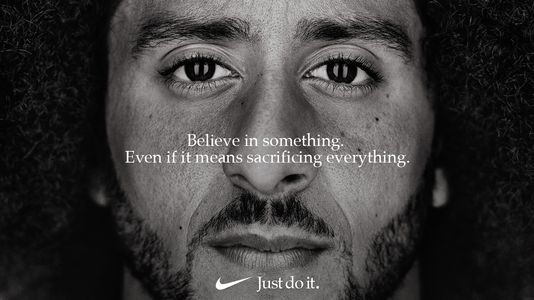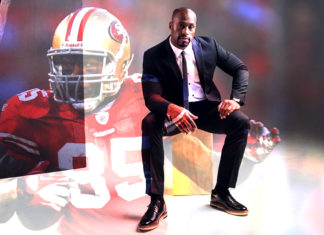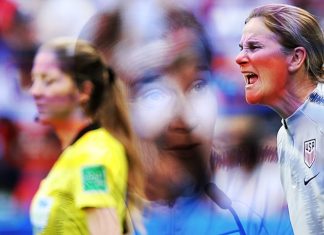The year is 1999, and Brandi Chastain has just put women’s soccer at the forefront of the American sports conversation. Her game-winner and subsequent jersey strip in a moment of pure passion is immediately an iconic image. At this point, you’d be hard-pressed to think that women’s soccer isn’t about to take off in popularity.
Fast forward to 2019, a full 20 years after Chastain’s heroics. The American women are soaring again at the Women’s World Cup. But while women’s soccer has since skyrocketed in popularity, equality is much more of a far-flung idea than a reality.
A host of issues persist with the way the Women’s World Cup is handled, and more than one party is responsible. Most notable are FIFA (Fédération Internationale de Football Association), the international governing body overseeing the sport of soccer, along with the U.S. Soccer Federation, the governing body of the U.S. Women’s National Team (USWNT).
You need not look too hard at the lead-up to the 2019 Women’s World Cup to find plenty of problems. There are the obvious, including unequal wages and several logistical and environmental factors resulting from less pay for women, plus the ancillary problems that illuminate many larger issues, including ticket sales and operations.
Sadly, and perhaps unsurprisingly, inequality is truly a top-to-bottom phenomenon.
The Ongoing Issue of Wage Inequality
First off, let’s not pretend that the issue of equal pay is confined to women’s soccer. However, U.S. Soccer is actually preparing to defend itself in court. An institutionalized gender discrimination lawsuit was initiated by 28 women’s soccer players, meaning that the Women’s World Cup is being played in the shadow of a legal challenge that U.S. Soccer is all too willing to fight. And that makes this a noteworthy subject as the Cup continues.
The Ringer did an excellent job detailing many of the ongoing issues that rendered the lawsuit necessary. Frankly, it’s been a long time coming, with a trickle of dissenters dating all the way back to 1996, when some women boycotted training for the Olympics due to an insulting contract offer. It didn’t end there, with more issues arising following the miracle 1999 World Cup team that featured the likes of Chastain and Mia Hamm, and the early seeds of the 2019 lawsuit being sewn in 2016, when five players filed an initial Equal Employment Opportunity Commission complaint. Now it’s a full-blown lawsuit that U.S. Soccer can’t ignore.
Here’s the crazy thing. Team performance matters, and sports is obviously a performance-based business. Yet despite the ongoing futility of the U.S. Men’s National Team, the pay for a women’s player who manages to play 20 games in a year would be $99,000, compared to north of $263,000 for a men’s player who has similar success, according to the estimate in the women’s lawsuit.
A gap of more than $160,000 isn’t at all reasonable, especially in light of the superior performance of the women’s team both on the field and in the ratings that influence ad revenue. USWNT wins 20 games a year, has won three of the seven Women’s World Cups, and just opened play in 2019 with a record-breaking 13-0 win over Thailand.
Now consider the coin. The women’s team outpaced the American men by more than $20 million in revenue in a single year. Compare that to the salary numbers, and … yikes. There’s no logical defense for the men to make 166 percent more in salary while the women generate tens of millions more in revenue.
Let’s Talk Tickets
While the wage gap is the most egregious and most discussed issue with the Women’s World Cup, and specifically the USWNT, there are plenty of other areas in which the players are getting shortchanged.
Imagine purchasing a set of tickets to enjoy the game with your friends or family, only to find out you aren’t sitting together. That’s a real thing that happened to more than a few fans who bought tickets to the Women’s World Cup.
Clearly, this was an attempt by FIFA to get rid of single seats, which are practically unsellable and will really only move at the last minute to desperate fans hoping to simply get in the stadium, if at all. Instead, soccer’s governing body decided this was a way to maximize the advance revenue to the event.
Of course, it would have been a mess to unwind—reseating several hundred or thousand fans would be akin to dumping the world’s largest puzzle out of an airplane and trying to put all the pieces together. So instead of attempting to do so, or even offering refunds or altered accommodations, FIFA simply said fans were warned upon checkout and could have backed out of their purchase before completing.
Ah, the old bait ‘n switch. But it was in the fine print! Yeah, but it wasn’t communicated clearly that this would happen, and it obviously wouldn’t have been a reasonable expectation from fans. At best, this was a lazy and poorly executed strategy to scrape the barrel of ticket revenue for this event. At worst, it was a situation set to fail from the beginning due to poor planning or absent effort, which would imply a lower level of care for the women’s game.
Leveling the Pitch
Forgive me if this question sounds so 1980s…or 1990s…or 2000s…
We’ve already established that the USWNT generates more revenue than the men’s squad, and the women’s game is growing in popularity, no thanks to traditional media coverage, which hasn’t increased much for women’s sports over the past couple of decades.
FIFA needs to figure out how to treat their women’s event as though they care that it exists. It starts at the top, and the organization apparently can’t get out of their own way when it comes to a rapidly growing segment of soccer fans.
Additionally, U.S. Soccer must come to the table with some real solutions when it comes time to sit down with USWNT and discuss equal pay. If the federation simply goes to court and allows the lawsuit to run its course, it won’t exactly help with public perception.
Ultimately, this is all a result of the institutional incompetence of FIFA and the institutional inequality with which U.S. Soccer is apparently still comfortable. If either institution had their proverbial ducks in a row, we’d be focused on the actual sport and pending heroics of Megan Rapinoe and Alex Morgan and the rising star of Mallory Pugh, among other young up-and-comers.
So, it’s time to multitask. Enjoy the games and heroics. Another Brandi Chastain-esque moment could be just around the corner, and it’s not like we’re getting heroics from the U.S. men’s team anytime soon. But don’t gloss over the ugly, unequal underbelly of U.S. Soccer, FIFA, the Women’s World Cup, and society as a whole.














[…] soccer star is known for her advocacy for LGBTQ+ rights, equal pay, and female sovereignty - all areas Trump puts the least amount of his presidential power and […]
[…] inequality is perhaps the most tangible issue facing women’s sports, as illustrated by the stark contrast in annual […]
[…] sued the U.S. Soccer Federation for fair wages relative to the men. It was a move that reflected long-simmering frustrations over pay inequality given the success, in both wins and ratings, of the women’s team. And in more […]
They aren’t as good as the men . . . that’s what nobody wants to say but everyone knows is true. Yes, the women’s team is amazingly good and fun to watch (I don’t miss any of their games) for a women’s league but if they played the men’s team they would make Thailand look good. It would be 20-0 for the men. That’s just facts.